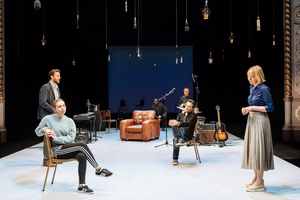Review: MOOD MUSIC, Old Vic Online

![]() Songwriter Cat has a commercial hit record under her belt and should be on top of the world. Instead, she's embroiled in a heated conflict with her music producer Bernard over who should have the songwriting credit. Contractually bound to make a second album together, the pair hide behind lawyers while venting to therapists. The seemingly simple premise opens the floodgates to a whole host of timely and topical debates, which range from art and authorship to power and responsibility.
Songwriter Cat has a commercial hit record under her belt and should be on top of the world. Instead, she's embroiled in a heated conflict with her music producer Bernard over who should have the songwriting credit. Contractually bound to make a second album together, the pair hide behind lawyers while venting to therapists. The seemingly simple premise opens the floodgates to a whole host of timely and topical debates, which range from art and authorship to power and responsibility.
The astute eye of playwright Joe Penhall coupled with the compelling prowess of Ben Chaplin should make for an entirely engaging, even electrifying, experience. However, while a lot of high notes are hit, a great deal of the play falls flat. This is largely due to the vast amount of exposition, which by its very nature prevents us from fully investing ourselves in the characters and their stories.
Chaplin is magnetic and very well cast in the role. He has plenty of fun with the character, who encompasses all of the stereotypes we'd associate with a rule-breaking, non-PC music producer, but still manages to elicit some depth. Chaplin is also gifted the most humorous dialogue and his often deadpan delivery is successful in drawing some much-needed laughs.
Seána Kerslake is given less to work with as Cat, and although we sympathise with her situation, we also find ourselves frustrated with the character's contradictions. She wants to make a commercial record and reap the rewards, yet loathes the idea of fame.
The stage is a recording studio, which morphs into a courtroom and therapist's office and back again. As the actors roam about the stage, their dialogue effortlessly overlaps and establishes an initially high tempo, but rather than building towards a crashing crescendo, we all too often meander off track.
There is a lot of meat here in terms of subject matter and ideas, but sadly the characters don't have enough flesh to make them well-rounded and absorbing people in their own right. Instead, they feel far more like ciphers for Penhall to make his points - and they are interesting points. The trouble is, as each tantalising topic is tackled and we begin to explore it, too quickly it is drowned out by the beat of the next idea.
Creating great art and achieving commercial success at the sacrifice of one's wellbeing is a fascinating subject, as is the idea that art is always the result of some form of collaboration. The incongruous relationship between the creative and business side of art, and the suggestion that damaged individuals are better placed to produce work of true meaning and value, are other intriguing angles.
As it stands, all of these ideas merge into a busy backing track and, in the absence of one coherent voice to follow, the play fails to cement a central idea and explore it in enough depth. With so much potential here, especially following such cultural shifts as the #MeToo movement, it feels as though the play (which premiered at the Old Vic in 2018) has missed a beat and arguably played it safe.
A production as wordy as this could also benefit from more in the way of visuals or, in this case, music. Seeing silent instruments sitting on the stage leaves us frustrated - that they aren't being played, but also that our attention is at times on them when it should be on our protagonists. The right notes are certainly there, but in many ways their ambiguous arrangement takes away from what should be a far more powerful and provocative piece of theatre than it is.
Mood Music is available to stream for free on the Old Vic's YouTube channel until 14 July
Photo Credit: Manuel Harlan
Reader Reviews

Videos


